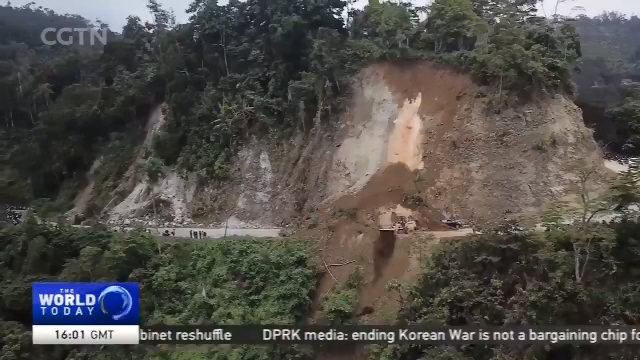
08:41, 03-Oct-2018
Indonesia Quake-Tsunami: Four days after quake, survivors face shortages of basic necessities
Updated
08:14, 06-Oct-2018
02:24

To Indonesia. Four days after a deadly earthquake and tsunami struck the island of Sulawesi, survivors are struggling to cope with an acute shortage of basic necessities.
In Palu city, evacuees spent the night on the ground in open air, after their homes were completely destroyed by the twin disasters. Meanwhile, ships carrying aid from various parts of the country are heading to the affected areas. The country is in a race against time to save survivors as the official death toll continues to climb. CGTN's Tony Cheng has more details on the aftermath of the catastrophe.
A birds-eye view of the challenges facing the people of Palu. A high mountain pass, blocked, as a digger frantically tries to clear the route. This is one of only two roads into the city. Cars, trucks, heavy equipment, needed vitally inside Palu, now at a standstill.
TONY CHENG SULAWESI, INDONESIA "Well, this is the problem facing the Indonesian government. This is one of only two roads leading into Palu and an aftershock brought down a landslide that has completely blocked the road. They've been working to clear it for the last 2 hours but they reckon there are another couple of hours to go, but for several km down the road, the traffic is completely backed up."
On the road, people desperate to get to their relatives. This bus had come from the East of Sulawesi, on the road for 24 hours, bringing supplies to family members now stuck.
Fuel also in very short supply, everyone carrying extra petrol for the trip back. This search and rescue team was trying to relieve their 6 colleagues inside Palu who'd been working since the disaster struck. Sebu tells me they need specialist equipment and food. Some heavy equipment moves up to help clear the road. And eventually, after 2 more hours the traffic starts to flow. Emergency vehicles are the first to head down the mountain, but with all the delays, it's now a race against time, Tony Cheng, CGTN, Sulawesi, Indonesia.

SITEMAP
Copyright © 2018 CGTN. Beijing ICP prepared NO.16065310-3
Copyright © 2018 CGTN. Beijing ICP prepared NO.16065310-3